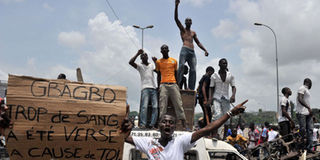Women shot dead in Ivorian demo

Residents gather on the street where security forces loyal to Ivory Coast's strongman, Laurent Gbagbo, opened fire on demonstrators, killing at least six women, on March 3, 2011 in Abobo, a working class neighborhood of Abidjan. A man in the crowd carries a sign which reads "Gbagbo, too much blood has been spilt because of you." The women were among hundreds gathered to call for the ouster of Gbagbo. AFP PHOTO / ISSOUF SANOGO
ABIDJAN, Thursday
Security forces loyal to Cote d’Ivoire strongman Laurent Gbagbo shot dead at least six women at a demonstration on Thursday in support of his rival for the presidency, witnesses said.
They started shooting as several hundred women gathered in the Abobo neighbourhood of Abidjan, a stronghold of Alassane Ouattara, and shouted “Gbagbo, get out!” and “Alassane for president”, a resident told AFP.
When the Defence and Security Forces, the army backing Gbagbo, arrived with an armoured vehicle, “they opened fire,” another resident said.
“Six women were killed on the spot,” he said.
Other witnesses said the toll was higher and there were many wounded, some by gunfire and others in a stampede that followed the shooting.
Violent clashes have erupted in the west African country since a disputed election on November 28 which Ouattara is internationally recognised to have won.
On Thursday, the UN said 50 people have been killed in Cote d’Ivoire violence over the past week, including 26 in an Abidjan district that has witnessed fierce clashes, the UN mission said.
Meanwhile, the United Nations admitted on Wednesday it had falsely accused Belarus of sending three attack helicopters to Ivorian strongman Laurent Gbagbo. UN peacekeeping chief Alain Le Roy made a public apology to Belarus for the “mistake” which he blamed on erroneous reporting by the UN mission in Cote d’Ivoire.
The apology was a blow to the UN ahead of a key Security Council debate attacks on UN peacekeepers in Cote d’Ivoire and rising tensions between followers of Gbagbo and Ouattara.
Mr Le Roy called it “a very bad incident for us.”




